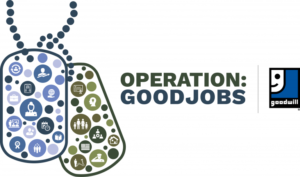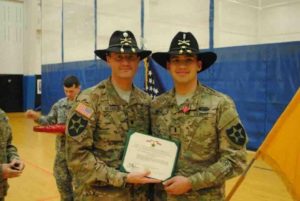For military veterans, transitioning back into civilian work life isn’t simply a matter of picking up where one left off. Time away from the civilian workforce is a factor. There may be gaps in skills and education. In some cases, there are physical or psychological barriers to overcome.
Fortunately, an organization that is a fixture in many communities is helping to connect veterans with new employment opportunities.

Goodwill Industries has been a key player in providing employment assistance to returning veterans such as career counseling, job training and access to credentials, job placement, and career advancement services, family support services, and more through its Operation: GoodJobs program.
Since 2012, the initiative has helped more than 7,800 veterans in California, New York, North Carolina, South Carolina, and Texas. Operation: GoodJobs works with employers and job creators to connect them with what Goodwill describes as “highly skilled and mission-ready potential employees.” The Walmart Foundation has provided $11 million in funding over that period of time, renewing its commitment for an additional three years in 2018.
The newest iteration of the initiative will put a special emphasis on resources and job training for female veterans. Goodwill says in 2017, 2,000 women vets were unemployed and that the program has helped many gain meaningful employment at an average national wage of $15.48 per hour.
Wesley Meno is a career coach with Goodwill Industries of Upstate/Midlands South Carolina. He says the program helps break down some of the barriers that exist as transitioning veterans integrate into the civilian job market.
“A lot of veterans don’t know how to do that because they come home, and they essentially barricade themselves within their own little world. And when they get to that point, they don’t understand the various forms of assistance and resources that are out there to help on their behalf,” according to Meno.
Open communication and engagement with civilian employers is key to a successful transition.
“It’s important to include networking with employers to be able to help dissolve that sort of misunderstanding that most civilian employers have about what a veteran brings to the table when it comes to re-entering the civilian workforce, and what can they do or what can they bring from their time in service and skills, duties and responsibilities, and how that can translate to them successfully entering the civilian workforce,” he adds.
“What I hope to see with a lot of our employer counterparts within the civilian workforce is essentially all they’re doing is just listening, to either people who have worked with veterans before who understand their issues or veterans themselves and just understanding,” says Meno.
“Not really dictating ‘This is what you need to be, this is what you need to do,’ but more along the lines of saying, ‘What kind of trouble are you having? What is making this transition harder for you? Are you, are you happy you got out or are you not happy right now?’ Just being able to listen and effectively ask questions.”
Meno also tells WorkingNation that the program’s success in helping vets lies in Goodwill’s ability to develop relationships with state agencies and other non-profits to share resources.
“(The reason) why it’s essentially important to be able to work together with all these different organizations is that one organization has access to a service that another organization does not. Maybe one organization cannot provide a form of supportive services. Operation: GoodJobs does provide that, as well as different referrals to other issues that a veteran or veterans may have.”
Meno says they get a lot of questions about health care and housing issues. “That includes homeless veterans’ initiatives, people who are just now getting themselves into their V.A. system, which they hadn’t initially done so before,” he explains. Helping veterans navigate the myriad options available to them is an important component of Operation: GoodJobs.
Meno cites his own experience as a motivating factor in his work with Goodwill. He served in the Army from 2011-2015, holding the position of recon platoon leader with responsibility for 18 service personnel and over a million dollars worth of equipment.
“When I transitioned out of the Army, I had that feeling of thinking, well, I’ve held a considerably higher-ranking position that required a lot of responsibility over people, over equipment, over operations, planning, long-term projects as well,” he says. “And I had that in my line of thinking, ‘Well I’ll be fine because I held that.’”
“But when you come out, essentially what they don’t tell you, and what I’ve learned is, you need to look at yourself in the mirror with as much humility as possible and understand that A) you must be willing to take a pay cut in whatever you do, and B) you must be considerably ready to start all over again essentially because you really are starting all over again.”

“But the good news is that there are a lot more civilian companies out there that understand that source skillset that veterans bring to the table, and the more they understand it, the higher and faster it is for them to be able to promote within the company.”
For many veterans, the issue is one of trying to figure out where they fit into society and the workplace when they return home. Meno says he was able to take what he found fulfilling in the Army and transfer that to his civilian life.
“So, I guess with my journey, it was more along the lines of understanding really what I wanted to do and who I wanted to be. And I found out I enjoyed and felt a personal satisfaction to see other soldiers, that I was in charge of, develop into better human beings, better adults, better men, and better fathers as well. And just overall better individuals for society and for humanity. And I looked back and saw that as a flag saying, maybe I can rally around this into the next chapter of my life.”
“And that’s why I enjoy what I do right now. Just to see people who get work and find themselves, find something that they could rally themselves around and say, I’m really good at this. Thank you for connecting me with that because essentially the one thing that separates one person from a better quality of life is just an opportunity, where somebody coming at them saying, ‘Here’s an opportunity. I know you can do it. All you have to do is just take a chance.’”
Follow more of our Vets Deserve Good Jobs coverage here.
© Copyright 2024 by Structural Unemployment, LLC dba WorkingNation